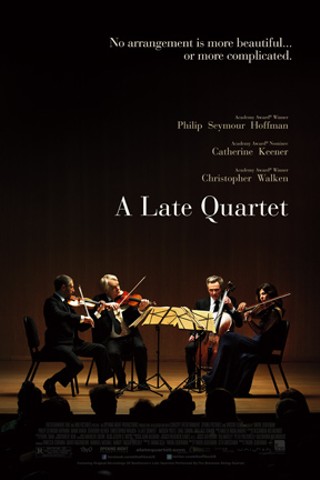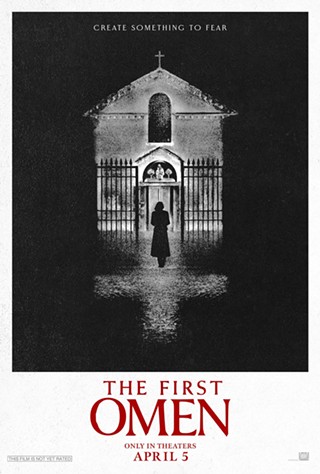It could be about any profession—construction, the law, advertising; a story about a leader retiring offers wide-open avenues for exploration. There are the emotions of the outgoing boss, others on the team looking to rise, members of that same team who will feel lost without their captain, and so on.
A Late Quartet brings music to the retirement watch, which certainly makes our experience better—but the story burns through its interesting characters and circumstances quickly, and devolves into a high-rent soap opera. There are still potent highlights, but like any retirement party, a lot of this is just windbagging.
Pleading no mas is Peter Mitchell (Christopher Walken), who 25 years ago formed the Fugue, a string quartet. As they prepare for their silver anniversary, Peter informs the group that he's been diagnosed with Parkinson's disease. His work on the cello is not as precise, and in this line of work, it has to be. But having just endured the death of his wife, Peter seems to be leaving more because he's tired of fighting and less because of his impact on the quartet.
Robert and Juliette (Philip Seymour Hoffman and Catherine Keener) are the married members of the Fugue, and within hours of hearing the news, they suffer a slight breakup of their own: Robert tells his wife that after a quarter-century as second violin, he'd like to be first. Or at least he'd take some first violin parts from time to time. Juliette, strictly professionally, disagrees. That's gotta sting.
She may have a point, though, because Daniel (Mark Ivanir) is a remarkable musician and displays all of the confidence, knowledge and even elitism you might expect from a man who can afford a massive Manhattan loft based only on playing the same pieces of classical music over and over again for a lifetime. He's also (cue the soap-opera organ) having an affair with Alexandra (Imogen Poots), his student and Robert and Juliette's daughter.
Director and co-writer Yaron Zilberman is a confessed chamber-music fan, and his attention to detail in that regard makes the working-musician component of A Late Quartet utterly believable. In fact, if there were three actors as unheralded as Mark Ivanir in the other principal roles, you might accept that you were watching trained musicians act instead of really good actors engaged in musical mimicry. But the lives Zilberman builds around the music are minuscule by comparison; it's doubtful watching this same setup in a law firm or ad agency would prove worthwhile.
If you saw Seven Psychopaths earlier this fall—and unfortunately, you'd be one of the few—then you saw Christopher Walken on overdrive. It's the sort of role written just for him, because nobody does weird in exactly the same way. And he's spectacular in it, even if that side of Walken has been drastically overexposed in the past few years. A Late Quartet takes Walken out of that realm entirely. Peter Mitchell is erudite and sad, and he's obviously the glue that holds the Fugue together. For a guy whose late career has been marked by unpredictability, this relaxed, low-key performance is refreshing.
Hoffman and Keener are true professionals, and you rarely get anything worse than a very good performance out of either of them. That's what is so disappointing about the nature of their conflict: After their spat about playing second violin to Daniel, Robert deals with it by having a one-night stand. Pretty pathetic. Worse is the dialogue that follows Robert and Juliette around for the rest of the picture, stuff like, "You never thought I was good enough," and other nincompoopery. It's as if an Ashley Judd movie suddenly broke out in the middle of this. But as true professionals, Hoffman and Keener plow through it. In fact, the performances are keepers all the way around. There's just enough of what these musicians do for a living to keep things interesting, and to make up for the silly business about affairs.
One added benefit of immersing this story in the world of classical music is the ready-made dramatic score. There are hundreds of years of music to choose from, but A Late Quartet features Beethoven's Opus 131 string quartet. The piece contains seven movements performed without a break. As Peter explains, the instruments will all go out of tune, forcing each member of the quartet to adjust to the other instruments on the fly. As our story develops, that explanation is a metaphor for the film, of course, with Opus 131 fitting the moods and actions of the characters quite well. (Music for the film is performed by the Brentano String Quartet, and it's worth seeking out.)
It's a complex composition, and conceptually, it makes a great backbone for the plot of a film. Now they just need the rest of the movie.











